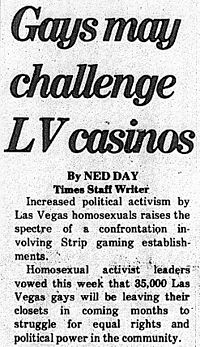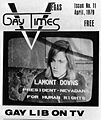ACLU-Las Vegas
American Civil Liberties Union in Las Vegas
(c) Dennis McBride, 2009
Organizing in Nevada
The first national organization to join the fight for gay equality in Nevada was the American Civil Liberties Union [ACLU]. The Nevada affiliate was founded in Reno in 1966 by a group of “civil libertarians, attorneys, and academics,” led by Dr. Jack Forbes, a professor of Native American history at the University of Nevada, Reno [UNR]. In about 1975, a Las Vegas school principal named Robert Throckmorton organized a southern group of the ACLU and opened an office in Las Vegas. The north and south groups formed a statewide organization overseen by a Board of Directors, whose president was Robert Throckmorton.[1]
It was the ACLU-Las Vegas that made the first appeal to the gay community to organize. On September 20, 1977 ACLU-Las Vegas sponsored a gay equal rights seminar at the Clark County Library on Flamingo Road. More than 100 people showed up to hear Sheila McWilliams of the Orange County, California Human Rights Organization and Los Angeles lawyer Tom Hartman, co-chairman of the Gay Rights National Lobby, call for Las Vegas gays to organize as a political bloc. Hartman urged them to affiliate with the ACLU because it already existed as an organization and supported equal rights for gay people.[2]
Valley Times reporter Ned Day produced two fear-mongering articles that sensationalized the ACLU event. "Homosexual activist leaders vowed this week that 35,000 Las Vegas gays will be leaving their closets in coming months," Day wrote, "to struggle for equal rights and political power in the community. And ... this struggle could spill over onto the Strip, where gays may challenge county ordinances related to gaming licenses". Another article Day wrote was headlined, "Mormons Warned to Stay Clear.”[3] "There is a lot to be afraid of," Hartman said at the library event, "but we have the power to overcome the danger if we organize.”[4]
At the same time Lamont Downs and Steve Hinkson took Hartman's advice to pull the Las Vegas gay community together. Downs and Hinkson had recently moved to Las Vegas from Rochester, New York, where both had been involved in organizing the gay community, and where Downs had been assistant editor of Rochester’s gay publication, The Empty Closet.[5]
Vegas Gay Times
"I decided it was time to start a newspaper," Downs says. "The most difficult part was finding a printer. And so I called the ACLU, found them very supportive, and they suggested a good printer that we could deal with. They also suggested that we become involved with them, and so for a short time the paper was being published in conjunction with the ACLU's Human Rights Committee, which was a way of basically getting a little bit of the ACLU's prestige behind us without committing them to publishing the paper—because we were obviously a single-issue paper and the ACLU is not a single-issue group."[6]
That paper was the Vegas Gay Times, the first issue of which had appeared in June 1978, published independently by Downs and Hinkson. Beginning with the second issue, July 1978, the Vegas Gay Times associated itself with the ACLU's Human Rights Committee, an association that lasted until June 1980. It was with the power of a gay press and logistic support from the ACLU-Las Vegas that Downs, Hinkson, and several other community activists involved in publication of the Vegas Gay Times founded the state’s first gay political organization, Nevadans for Human Rights [NHR], whose first meeting was held January 13, 1979.[7]
Working with the Community
Over the last 30 years, the ACLU has maintained a close relationship with Nevada’s gay community. In 1998, the ACLU established a lesbian/gay rights project specifically to work with the gay community. The ACLU has also been involved in every important gay equal rights legislation in the state: the repeal of Nevada’s sodomy law [1993]; the unsuccessful fight against Question 2, which amended Nevada’s constitution to prevent same-sex marriage [2000-2002]; Nevada State Senate Bill 207, which forbids discrimination in public accommodation based upon sexual orientation [2009]; and establishment of Domestic Partnership in Nevada [2009].[8]
Image Gallery
Notes
- ↑ http://www.aclunv.org/history-aclu-nevada; Las Vegas Review-Journal (April 27, 1975), 9.
- ↑ Panorama (September 16, 1977), 29; Las Vegas Review-Journal (September 21, 1977), 1A; Las Vegas Sun (September 21, 1977), 1; [Las Vegas] Valley Times (September 21, 1977), 1; (September 22, 1977), 1; Vegas Gay Times (July 1978), p. 3.
- ↑ [Las Vegas] Valley Times (September 21, 1977), 1; (September 22, 1977), 1 [Clark County Ordinance 8.08.030 required gaming establishments in Clark County to keep homosexuals out, together with prostitutes, vagrants, drug pushers, and gambling cheats.].
- ↑ Las Vegas Sun (September 21, 1977), 1
- ↑ Lamont Downs, interview by Dennis McBride, May 12, 1984 [author’s transcript]
- ↑ Ibid.
- ↑ Downs interview; Vegas Gay Times (February 1979), 2; University of Nevada, Las Vegas Lied Library, Special Collections Department MS 85-121: Las Vegas Gay Archives.
- ↑ Bohemian Bugle (March 1987), 1, 14; Las Vegas Bugle (December 1992), 7; (December 1997/January 1998), 6, 8; (March 1998), 5; (September 29, 2000), 9; Night Beat (June 1993), 7; Las Vegas Review-Journal (June 17, 1993), 1B, 10B; (March 28, 2009), 1B, 11B; (April 9, 2009), 2B; (May 31, 2009), 1A, 21A, 22A; (June 1, 2009), 1A, 5A, 2B; (June 24, 2009), 21A; Q Tribe (January 1998), 16; Las Vegas City Life (April 16, 2009), 14; Judy Corbisiero, interview by Dennis McBride, September 5, 2003, May 21, July 2 and December 10, 2004 (author’s transcript); Lee Plotkin, interview by Dennis McBride, August 2, 10, and 16, and October 4, 2006 (author’s transcript); Lori Lipman Brown, interview by Dennis McBride, March 17, 1998 (UNLS transcript F845.25 L57 L57 1998).













